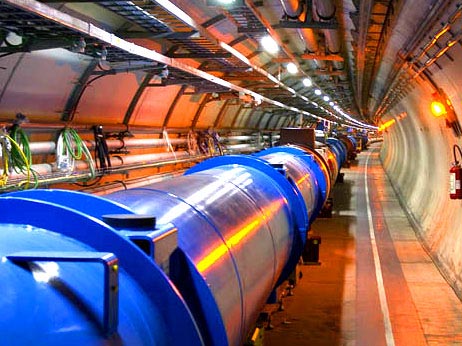First experiment with LHC large particle accelerator
The European Atomic Research Organization (CERN) has successfully conducted experiments to create a direct collision between extremely large energetic protons, which has never been done in large particle accelerators with LHC name.

The collision between protons made at level 7 TeV is the result after nearly 20 years of hard work by scientists at CERN.
Scientists hope that through research done with LHC, a new era of basic physics will be opened.
The large particle accelerator promises to allow humans to better understand the origin of the universe, even to clarify some of the mysteries of matter with the identification of particles that currently exist only theoretically.
The first experiments with the LHC were successfully carried out by CERN scientists at 13 pm on March 3 at the organization's headquarters.
After announcing the success of this historic experiment, CERN Director Rolf Heuer said, "We are very happy and touched. This is a great time for the scientific world."
The current large capacity of the LHC will allow scientists to explore the mysteries of the world and be considered a revolution of science.
The accelerator considered to be competitive with the LHC is the Fermilab machine in Chicago, the United States has only performed proton collision testing at a level of 2 TeV.
Meanwhile, LHC promotes full capacity to implement proton collisions at a level of 14 TeV./.
- Large particle accelerator stops working due to mating bite
- China wants to build a particle accelerator twice as large as the LHC
- The LHC accelerator will operate at the highest energy before
- China built the world's largest particle accelerator
- Can this Chinese super machine
- The world's largest particle accelerator will restart after two years
- Visit the biggest machine in human history
- Atom smasher creates new material
- China will have the world's largest particle accelerator
- Brazil built a large particle accelerator with a football field
- The universe can disappear because of
- Large accelerator detects five new particles
 Van Allen's belt and evidence that the Apollo 11 mission to the Moon was myth
Van Allen's belt and evidence that the Apollo 11 mission to the Moon was myth The levels of civilization in the universe (Kardashev scale)
The levels of civilization in the universe (Kardashev scale) Today Mars, the sun and the Earth are aligned
Today Mars, the sun and the Earth are aligned The Amazon owner announced a secret plan to build a space base for thousands of people
The Amazon owner announced a secret plan to build a space base for thousands of people